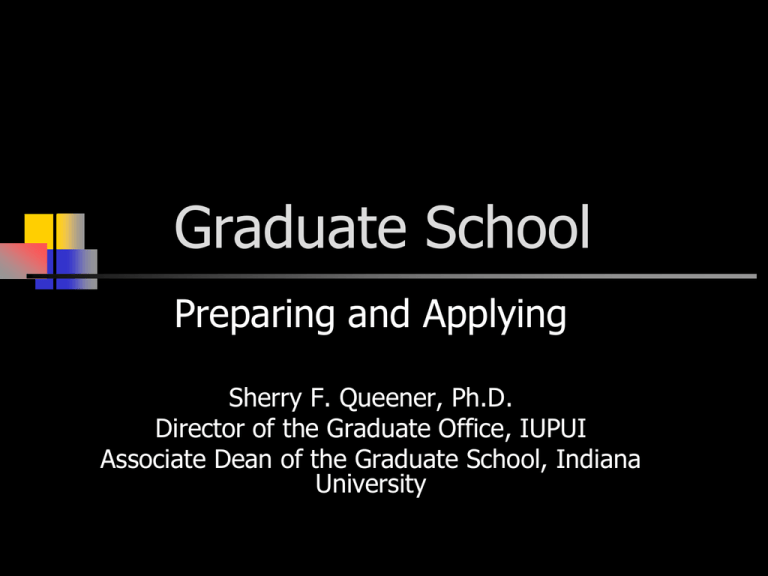Applying to Graduate School
advertisement

Graduate School Preparing and Applying Sherry F. Queener, Ph.D. Director of the Graduate Office, IUPUI Associate Dean of the Graduate School, Indiana University Is Graduate School Right for You? Is your desire for deep knowledge of a field unsatisfied? Is graduate work required for the career you have chosen? Are you thinking more of the road not taken? Is your career stalled? Issues to Confront Academic Issues Academic preparation Matching the program with career goals Personal Issues Financial planning Time management Relationships Academic Qualifications Have I taken the right undergraduate courses? Are my grades good enough? Find out what courses are expected Most graduate programs require a 3.0 GPA What if the answer is no to these questions? Use the Graduate Non-degree Program Match Program to Career Goals Graduate programs demand Deep knowledge base (“steward of the discipline”) Developing professionalism Life-long-learning Careers demand Knowledge and skills to apply to problems Professional behavior Creativity and flexibility Leadership skills What Type of Degree Do I Need? Academic doctoral Traditional masters Professional masters Traditional professional PhD MS, MA MS, MA, MPH, MHA MD, DDS, JD, DPT, MSW Researchbased Researchbased Practice-based crossdisciplinary Practice-based 4 to 7 years 2 to 3 years 1 to 3 years 3 to 5 years Major research Research with Research project with thesis or project or dissertation capstone capstone Clinical practitioner training Can I Afford Graduate School? What is the true cost? Tuition and required fees Housing costs/living expenses Loss of current income Undergraduate loans: will they be deferred? What financial help can I get? Tuition waivers Stipend AIs Loans Do I Have Time for Graduate School? Time demands of graduate school Actual class time Research/study time Full time vs part time Time demands of life situation Commute time Child care Relationships Who will help me get through the emotional demands of graduate school? Parents Spouse Friends Children Fellow students Graduate Studies at IUPUI Keys to a Successful Application Applicant’s academic preparation matches program Applicant’s career goals match program Applicant has a plan for success Application shows signs of careful preparation and planning The Graduate School Application Application form Academic record Admissions test scores Transcripts of all undergraduate work GRE, MCAT, LSAT, DAT, GMAT, …. Letters of recommendation Personal statement Admissions interview Online Applications Each one is unique Gather your information before you start Preview the ones for schools you are most interested in It is frustrating to stop and start because you have to look for a piece of information Read the instructions Help with the application is usually somewhere on the page, if you look carefully Graduate Record Examination (GRE) What is it? Verbal reasoning Quantitative reasoning Sustain a well-focused, coherent discussion Does every program require it? Emphasis on data interpretation Analytical writing “…measures your ability to understand what you read and …apply your reasoning skills.” No; confirm with your program How do I prepare? You have been preparing all along GRE website offers free practice materials Commercial or local prep courses Letters of Recommendation Who should write them? People who know your academic qualifications What do you need to give to the writers to help them write the letter you need? A copy of your transcript A resume Make certain the writer knows your career goals What is a Personal Statement? Also called other things Letter of intent Statement of purpose Autobiographical statement Personal narrative How do I know what “they” want? Look for guidelines specific to program Admissions Interview Project professionalism Be prepared to explain your goals Show knowledge of that program Have a list of questions Bring a copy of your resume to leave











